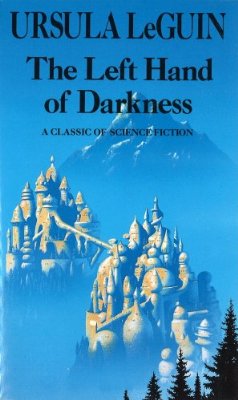
Ursula K. Le Guin's groundbreaking work of science fiction—winner of the Hugo and Nebula Awards.
A lone human ambassador is sent to Winter, an alien world without sexual prejudice, where the inhabitants can change their gender whenever they choose. His goal is to facilitate Winter's inclusion in a growing intergalactic civilization. But to do so he must bridge the gulf between his own views and those of the strange, intriguing culture he encounters...
Embracing the aspects of psychology, society, and human emotion on an alien world, The Left Hand of Darkness stands as a landmark achievement in the annals of intellectual science fiction.
Quotes and thoughts while reading:
I never write too much for the fiction books I read. I like to let the work speak for itself, and it seems a bit silly of me to pull out quotes and whatnot. I can say that this book imagines an entirely different world. With different rules for social conduct, but similar ways in which people act and respond to change. Ursula Le Guin is an author who's work I hope to enkoy more of.
" Traffic is controlled,
each vehicle or caravan being required to keep in constant radio touch with checkpoints along the way. It all moves along, however crowded, quite steadily at the rate of 25 miles per hour (Terran). Gethenians could make their vehicles go faster, but they do not. If asked why not, they answer "Why?" Like asking Terrans why all our vehicles must go so fast; we answer "Why not?" No disputing tastes. Terrans tend to feel they've got to get ahead, make progress. The people of Winter, who always live in the Year One, feel that progress is less important than presence" (p 52)
"There are aspects of ambisexuality which we have only glimpsed or guessed at, and which we may never grasp entirely. The kemmer phenomenon fascinates all of us Investigators, of course. It fascinates us, but it rules the Gethenians, dominates them. The structure of their societies, the management of their industry, agriculture, commerce, the size of their settlements, the subjects of their stories, everything is shaped to fit the somer-kemmer cycle. Everybody has his holiday once a month; no one, whatever his position, is obliged or forced to work when in kemmer. No one is barred from the kemmerhouse, however poor or strange.
Everything gives way before the recurring torment and festivity of passion. This is easy for us to understand. What is very hard for us to understand is that, four-fifths of the time, these people are not sexually motivated at all. Room is made for sex, plenty of room; but a room, as it were, apart. The society of Gethen, in its daily functioning and in its continuity, is without sex.
Consider: Anyone can turn his hand to anything. This sounds very simple, but its psychological effects are incalculable. The fact that everyone between seventeen and thirty-five or so is liable to be (as Nim put it) "tied down to childbearing," implies that no one is quite so thoroughly "tied down" here as women, elsewhere, are likely to be—psychologically or physically. Burden and privilege are shared out pretty equally; everybody has the same risk to run or choice to make. Therefore nobody here is quite so free as a free male anywhere else.
Consider: A child has no psycho-sexual relationship to his mother and father. There is no myth of Oedipus on Winter.
Consider: There is no unconsenting sex, no rape. As with most mammals other than man, coitus can be performed only by mutual invitation and consent; otherwise it is not possible. Seduction certainly is possible, but it must have to be awfully well timed.
Consider: There is no division of humanity into strong and weak halves, protective/protected, dominant/submissive, owner/chattel, active/passive. In fact the whole tendency to dualism that pervades human thinking may be found to be lessened, or changed, on Winter." (p 100)
<< click to go back
© JKloor Books
